Mascopedia
For those still thinking of moving to Japan to work in the games industry, despite all my posts、I can recommend having a gander at the rest of his blog too as he is currently “living the dream”. My blog is mostly retrospective on the whole process of breaking into the industry in Japan, it could be worthwhile checking out this guy’s experiences as they are happening right now.
While I am foolishly directing traffic away from my own site, I’d like to name-drop Innerbits too; a blog started by a few industry-insiders who, as they put it, are tired of the status quo and write remarkably mature editorials on the various aspects that plague our business as well as offering regular game related news. I am perfectly aware that, despite my best efforts, I often end up in mouth-frothing rant territory so people who want a more objective view on the things that ail can do a lot worse than check this site out.
Gamesmanship – part 8
To be held in high regard as a native-level Japanese speaker whilst simultaneously keeping a haughty attitude isn’t quite as difficult as it may seem thanks to the gamesman’s version of the old playground favourite “well, if you don’t know I’m not going to tell you!”
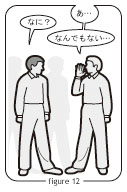 To fully understand the Japanese is a bonus but not required; you simply pretend to listen and at choice moments in the conversation attempt to join in with a witty or poignant remark. You mutter a “well…” or “um…" and wait until the people in conversation turn to you with expectant glances eagerly awaiting your input. You then brush it off with a dismissive “nah…” or “um, no, nothing, forget about it” as if to say you thought better of it and decided to not bother anyway.
To fully understand the Japanese is a bonus but not required; you simply pretend to listen and at choice moments in the conversation attempt to join in with a witty or poignant remark. You mutter a “well…” or “um…" and wait until the people in conversation turn to you with expectant glances eagerly awaiting your input. You then brush it off with a dismissive “nah…” or “um, no, nothing, forget about it” as if to say you thought better of it and decided to not bother anyway.The result is that the people around you perceive you to be either very humble, as if you decided your remark was unworthy, or haughty, as if they were unworthy to receive the remark; either is a good reaction for the gamesman. Most importantly, though, they will conclude that you have been able to follow the conversation closely so therefore your Japanese must be of a very high level.
As you can imagine no actual Japanese skill is required, just a keen sense of timing, but people will go round telling others what a master of the language you are.
A slight variation of this is the subdued chuckle: simply observe the crowd talking and whenever more than a few of them burst out laughing it is a safe bet to assume something humorous has been said. At this point, even this late in the proceedings, you should let slip a subtle “heh” to show you did understand the joke, even if you didn’t, and that, though slightly amusing, it wasn’t quite funny enough for you to guffaw at. The effect on the targets is similar to the technique above; they will think your Japanese is good enough to get the joke, but they will need to try harder if they wish someone in your high position to appreciate it fully. You are after all a serious and sophisticated foreigner and not laughing out loud at the jokes shows them what a base sense of humour they have.
The advanced gamesman may litter these tactics with a sprinkling of “so desu ne!” (“Isn’t it just!”) or “so ka?” (“You don’t say!”) remarks but be aware that the chances of being found out increase, especially if you have no inkling as to the general slant of the conversation.
Before long your perceived skill in the Japanese language will be legendary.
Dropping eaves
It’ll take a while of studying and acclimatizing to the spoken word before you can easily pick up what other people are saying but once you’re there a new world opens up to you; a very narrow and boring new world.
Whenever I try to cock an ear in the direction of chatting Tokyoites more often than not their conversation seems to revolve around the English language, their desire to be able to speak it and their wish to visit America some day.
Now I’m no Herbert Einstein but it seems to me to be highly unlikely that general Englishness is a topic of conversation for most people at any given time of day, or that I just have been very unlucky, or lucky, to coincidentally overhear only those conversations. Nor am I so arrogant as to presume I am the center of attention wherever I go, but it’s pretty obvious that the presence of such a white-skinned round-eye like myself sparks within the Japanese a wellspring of hidden desires and ambitions when it comes to internationalism.
I shall skim over the annoyance that people automatically assume I am American. Other foreigners are usually more understanding and ask you if you speak English before troubling you for assistance. And strangely you don’t meet many Americans in Tokyo but a Hell of a lot of Canadians, or should that be “Canadians”?
Either way I use every opportunity available to clear up the matter of my heritage save for accosting strangers in conversation. So I am left listening to the usual gossip.
“I wish I could speak English. I want to go to English school. No, I’ve never been to America, but I‘d really like to go. Don’t you speak English? English is so cool.”
This topic sprung to mind as I was trying to think of new ways to pad this blog, and The Man Who Fell Asleep’s excellent Tube Gossip columns seemed an appropriate appropriation. However, thinking of it some more it became obvious very quickly that page after page of chat about English would become extremely tedious.
Besides that people usually don’t talk on the trains. Apart from the death-throws and gurgles of crushed commuters, loud foreigners making threats and the occasional TV drama discussions by loud schoolgirls nothing much is said If you wondered how people manage to sleep on trains with such ease it is probably because it’s so quiet.
Apart from the occasional discussion about holidays in America, obviously.
Ganbattene!
What is much more of a necessity though is to grasp the meaning and interpret these social mores correctly or you’ll be in a world of pain and misunderstanding.
When learning the language you’ll find a lot of meaning is left to context and interpretation. This is how society seems to work too. You are never told in black and white terms to do or not do such and such, you will often not receive “yes” or “no” answers to your questions. Meaning, intent and desire are implied but never verbalized directly.
See for example this exchange:
A: “Can you do so and so by next week?”
B: “Hmm, well, I’m a bit busy.”
A: “Good luck!”
In the opening gambit person A isn’t really asking, he’s telling person B to do such and such by next week. This makes it very difficult to figure out when you are actually being asked for input and when you’re being told, but this is where context comes in. If you’re being asked in a pre-production meeting about the possibility of finishing something by a certain date it is obviously a question. If you’re being asked during a stressful meeting nearing a deadline, it is probably a demand.
In the second line B rudely ignores the order and implies a “no”answer. By stating he is busy he is basically telling A he is too busy to do what he is asked to do. This is as close to a “no” answer you’re likely to see in this situation.
To retort A tells him “good luck!” or in Japanese “ganbatte!” This word is the most powerful of all commands when spoken by your superior. Seemingly an innocuous remark, even supportive, it is the way your boss will tell you to “shut up and do it!” He’s not saying “well, see how far you get” or “give it a go”, he’s saying it must be done.
Another example:
A: “I found this and that to not work as best it could. Could you give it the once over?”
B: “Ok, I’ll think about it.”
What B means with his reply is “I won’t think about it.” Nine times out of ten the cocking of the head, the intake of breath, the pensive look and the line “I’ll think about it” mean the person sees this as unimportant or simply disagrees with you and to end conversation on the matter easily and quickly he’ll promise to take it into consideration. But he probably won’t. Whenever you receive this answer it is safe to assume this avenue of questioning is at an end and any further questioning will be seen as pushy.
In social situations you’ll come across these little foibles too. I have heard it said, though it may be apocryphal, that in the Kansai area “would you like to come in for a cup of tea” means “please don’t come in and sod off already” As you can imagine his could lead to some uncomfortable situations for those not in the know.
Though initially baffling and somewhat annoying I personally think this method of implied interaction makes for a much better working environment. Though when things get tough you may wish for some concrete actions to be taken on the whole people seem less aggressive and pushy. When superiors start talking in direct terms you know they’re upset about something and that usually doesn’t bode well.
It also explains why so many foreign companies have a hard time doing business with Japanese developers and publishers. The way important subjects are approached is vastly different and foreigners come across as too direct and aggressive, whereas the Japanese are seen as indecisive and slow.
Sure, as a foreigner you can easily pretend to not grasp these fundamentals of implication and act on conversations directly, e.g. asking if it is absolutely necessary for you to come into work on the weekend and interpreting anything less than a “yes” answer as a “stay at home for free” card, but that only gets you so far and will give you a reputation of being difficult or at the very least impossible to communicate with properly. If you want to get your own way there are better avenues to explore as deliberately misusing the language I don’t think is the best approach.
Alternatively you could easily answer back directly as it is rather expected. Foreigners are not seen to be able to understand the subtleties of Japanese interaction, so if you are asked and you answer directly no one will be shocked or put out. It will, however, cement the preconception that foreigners are brash and arrogant..
The very best thing you can do is to at least meet them half-way and interpret their interaction as correctly as you can and stay away from “straight talkin’” as much as possible. It will create a much nicer working relationship which can only benefit you in the end, especially if you plan to live in Japan for some years in which case the onus to adapt is entirely on you.
Personally I find myself halfway. I go along as much as I can in the roundabout way of doing things and try to interpret everything that is said to me with an eye on possible hidden meanings and implications. On the other hand sometimes I think it is necessary for things to be laid out and addressed directly in which case I won’t shy away from a slightly aggressive and direct approach. I do this sparingly, however, as it marks me as a trouble-maker and overuse breeds contempt. I am, after all, a Brit, not Japanese, and though I am far from patriotic I do intend to remain a Brit for the rest of my life, partly because becoming Japanese is impossible and partly because it’s undesirable.
Go to shopping; BicCamera
 Though electronics stores are a dime a dozen in Tokyo and there are many brands and chain stores, my personal favourite is BicCamera for no real reason. It offers nothing above and beyond other stores like Sakuraya, Nojima, Kojima, Yodobashi Camera, etc.
Though electronics stores are a dime a dozen in Tokyo and there are many brands and chain stores, my personal favourite is BicCamera for no real reason. It offers nothing above and beyond other stores like Sakuraya, Nojima, Kojima, Yodobashi Camera, etc.Like most stores they offer a loyalty card scheme where, in BicCamera’s case you can get up to 10% of the value of your purchase in points on your card, which can then be used for other purchases. The newcomer to Japan will have many things to buy, like washing machines, refrigerators, air-conditioners et all, so points can accumulate very quickly, allowing you to make some other purchases for "free".
Your first priority in Japan will be to select one of the many electronics stores and get yourself a points card.
For the visitors these stores also offer a good opportunity to ogle the many gadgets available to Japanese consumers as they stock a variety of items from kitchenware, massage chairs, games, consoles and audiovisual equipment to cameras, watches, jewelry, mobile phones and bedding.
Though the shops vary in size it would be worth checking their respective headquarters. BicCamera, for example, has its HQ in Ikebukuro, but I believe their Yurakucho branch, close to the Sony building, is one of the larger ones, and was the scene of the PS3 launch debacle earlier this month.
People looking for cheap electronics are better off searching the backstreets of Akihabara, but your average consumer looking for electronic skin cleansers, automatic hoovering robots or 50 inch television/computer hybrids can stay away from that den of geekiness and simply visit these regular electronic shops for regular people.
Location: Yurakucho station is on the Yurakucho line.
Website: http://www.biccamera.com/
Map for the Yurakucho branch or any of the others.
Bonenkai
If you work at a Japanese company in the period from the end of November onwards you will most likely be dragged out for one of these bonenkais, a drinking party with your colleagues, usually paid for by the company, the celebrate…um, no, just to get blind drunk really. At the start of the evening one of your superiors will kick off the proceedings with a short speech, usually amongst the lines of “next year too, good luck, chaps!” and a “kempai!” If you weren’t aware of this yet it is very rude to start drinking before everyone has raised their glasses, even in less formal situations.
These occasions are a great opportunity to see your boss stiff as an owl and making a fool of himself. Impromptu slurred speeches will occur throughout the evening and maybe some of the more attention-hungry of your colleagues will provide some entertainment, usually a comedy speech, all to be enjoyed through the veil of Bacchus.
There will be much shouting and organizing of single-handclaps that people out for a quiet snifter will find no peace anywhere. Hell has heard no cacophony as two adjoining bonenkai parties in a single izakaya.
 One tradition is to pour other peoples’ drinks for them. The staff at the restaurant or izakaya will keep your table supplied with large bottles of beer and you are supposed to take one and pour some in the glass of the colleagues sitting around you. They, in turn, will keep their glasses raised to facilitate the pouring and murmur some humble appreciations. They will then rip the bottle out of your hands and pour your beer. Later on in the evening when people are too drunk to care it is acceptable to pour for yourself but as long as people are lucid this tradition of never pouring your own beer must be upheld as long as possible. This can get a bit tiresome as the glasses are often very small, but it’s a nice touch, I think.
One tradition is to pour other peoples’ drinks for them. The staff at the restaurant or izakaya will keep your table supplied with large bottles of beer and you are supposed to take one and pour some in the glass of the colleagues sitting around you. They, in turn, will keep their glasses raised to facilitate the pouring and murmur some humble appreciations. They will then rip the bottle out of your hands and pour your beer. Later on in the evening when people are too drunk to care it is acceptable to pour for yourself but as long as people are lucid this tradition of never pouring your own beer must be upheld as long as possible. This can get a bit tiresome as the glasses are often very small, but it’s a nice touch, I think.If you’re very polite, or just want to show off that you can do “Japanese” as well as the Japanese, take a bottle off your table and bring it with you to the boss’s table and pour him a drink. Even though all bottles come from the same stock it sort of shows him you are giving him your beer as a mark of respect and appreciation. If you want to mingle and chat with colleagues at other tables, always half-inch a bottle to take with you.
At the end of the evening you will put on a bit of a show along the lines of “how much do we pay? How much is it?” as you reach for your wallet. This is so the boss can whip out the company credit card with a flair and make a great showing of his (or his company’s) magnanimity. Then most people will slink off to a self-financed “nijikai”, a “second party” where the drinking continues. “Sanjikais” and “yonjikais”, 3rd and 4th parties, are not uncommon either but be aware that as the count increases so does the chance of you ending up in a karaoke bar. You will be forced to sing and your colleagues will feign appreciation, but the best thing about thee places is that they are a fairly cheap place to continue drinking until the trains start running again.
The trains in this period offer new and exciting challenges for the average commuter. In stead of the increasingly aggressive foreigners passengers now have to deal with and avoid as much as possible the many blind drunk revelers. People falling asleep upright, leaning against doors or slowly sinking off of their seats and ending up spread-eagled in the aisles or simply flying all over the place as the trains stops and starts are not uncommon sights. I always find it a lot of fun to watch, and people are generally amazingly understanding and helpful. Once I saw an old man miss his lunge for a strap and end up three doors down on the floor on his back. Within seconds he was being helped up and put on a seat by concerned onlookers. That’s one thing you have to appreciate in Japan; drunkenness is so much part of culture that in stead of turning up their noses they nod and smile knowingly. “Ah, look, pissed as a newt, bless ‘im.”
The real danger comes from the innate inability by the Japanese to hold their liquor. The last thing you want with a dicky tummy is to be in a swaying train and small explosions of bile are all too common. I was once silently laughing at this office lady who was apparently standing asleep, obviously drunk, when suddenly she threw up horizontally against the window she was facing. After the initial shock the onlookers started handing out tissues to those “affected” and one escorted the girl out at the next station in search of an attendant to look after her.
I haven’t drunk binge for a while now, but Japan certainly is the perfect place for it and December the perfect time. Everybody expects and tolerates it and one could easily fall asleep in the middle of the street and people will pass you by unheeded; something which can be accomplished throughout the year but seems to have a special place in bonenkai season.
Occam’s beard
Regular readers probably already know I look askance at the Japanese "bonus" system, and if it wasn’t enough of a scandal in and of itself it is made even more onerous with process and hierarchies. I could not begin to describe the calculations made to come up with my bi-annual “bonus” as I am not well versed in pataphysics, chaos theory or quantum finance, but it is mostly based on evaluation.

I am no fool. I have experience of evaluations and the one cardinal rule is to never grade yourself too low. If your bonus, or in this case “bonus”, depends on it you grade yourself too high if anything. If your producer had a mind to give you an A but finds you have given yourself a B it is very likely he’ll concede to your decision; after all, why pay more in bonuses if you don’t have to? So this time too I marked myself handsomely, a smattering of As with a few S grades thrown in here and here.
This evaluation then goes to the producer who gives you a final grade which is part of the Bonus Calculation Formula. Needless to say my S grades were ignored and I was granted all As in stead. It is then checked by the producer’s boss, his boss’s boss and the president, who all sign off and return the command down the chain a few times and then pass it on to finance.
Now you may think a scorecard consisting of only A grades is a pretty dandy thing and deserves a pat on the back; back at school that would certainly have been cause for celebration, I’d imagine. Well, no, apparently not. This merely allows me to get 100% of my “bonus”. Lower scores can take away from your bonus, but only S ranks can add to it. Blast! So over some cigarettes I broach the matter with my colleagues who tell me that these elusive S ranks are usually only given out to producers when they “produce” hit titles that earn the company a wad of cash. If working untold hours of overtime, weekends and holidays only gives me an A then why bother? Good question, my colleagues say. They don’t know, really. So even if I kill myself, even more, I will probably never get an S grade and so never get more than1 00% of my “bonus”? Indeed.
My colleagues have a laugh at the grades I gave myself. “Us Japanese are too humble for that,” they say. So am I, I tell them and explain my reasoning. A light bulb goes off in their heads and they start kicking themselves.
I really can’t tell you enough how I despise the “bonus” system in Japan. It is my salary they are holding back and there is no guarantee Ill get it all when the time comes. It is hung over your head like a carrot on a stick; like Tantalus we stand knee-deep in excrement which rises accordingly as we try to climb out, with moneybags over our heads which are always out of reach. Though my evaluation is in there are still things that can go wrong. Our project could suddenly die, the company could suddenly incur some immense costs, I could accidentally have a fight with the administrator on the train, mostly things out of my control.
Chances are they won’t screw me over. It is very probable that I do get my 100% “bonus”, or the rest of my promised salary in one chunk as it really is, but the thought that they might, they could withhold it is an extra helping of stress just when I don’t need it. I really need that money too, for some much desired luxuries: a new television, new clothes, a Wacom tablet, a haircut. “Bonus” payout day is next month and I’m sure I’ll let you know if things turn ugly, which they probably won’t, but they might.
Developers, be aware that signing that “seishain” contract automatically and irrevocably enters you into the “bonus” system. Unless you really need it for your Visa stability you might as well stay on a per-contract basis and enjoy the fact you won’t have to deal with this “bonus” nor have to spend afternoons ploughing through the paperwork to get it.
What was I thinking?
Was I not aware that the Japanese work very hard and long, and that the game industry doesn’t smell of roses but cheap, stale ramen? Did I not know the salaries were drastically lower here and career advancement more of an uphill struggle than Sisyphus could ever imagine? Am I not a two-faced conniving lollard for preaching the woes of work in Japan while at the same time providing hopefully useful information on the process? Well, no, not really.
My motives were, by and large, not to work in the games industry in Japan. While working in England I saw Japan as that otaku-heaven I think most people, rightly or wrongly, assume it is. I imported games, watched some anime and read some mangas. When an opportunity came for me to visit the country on a short holiday I jumped at it with much enthusiasm, and I was not disappointed. The moment you step out of Shibuya station for the first time and see that busy crossing, those massive television screens and the mass of people bustling about it leaves an impression; it usually is the first location I take friends to when they visit, just to show them that initial “wow” moment.
 It was a short holiday but I packed a lot into it, and my suitcase, filled as it was with games and plastic crap purchased on the many shopping excursions. The reverse culture-shock leaving Japan from clean, bright and friendly Narita airport and arriving at dark, dank and downright hostile Heathrow was immense. As I waited for my suitcase to make its way on the conveyor belt and reluctantly listening to “Rivers of Babylon” over tinny speakers dotted around the arrivals lounge I made up my mind, there and then, that Tokyo would be a pretty nifty place to live and that maybe I should start thinking about making the move while I was still young enough.
It was a short holiday but I packed a lot into it, and my suitcase, filled as it was with games and plastic crap purchased on the many shopping excursions. The reverse culture-shock leaving Japan from clean, bright and friendly Narita airport and arriving at dark, dank and downright hostile Heathrow was immense. As I waited for my suitcase to make its way on the conveyor belt and reluctantly listening to “Rivers of Babylon” over tinny speakers dotted around the arrivals lounge I made up my mind, there and then, that Tokyo would be a pretty nifty place to live and that maybe I should start thinking about making the move while I was still young enough.I hadn’t studied a word of Japanese, nor done any kind of research into the legal minutiae of the task, but being rather stubborn and impulsive my mind was made up and within a year plans had been set into action. With the purest, naïve optimism of a man who knows not what he is up against I sent my resume and portfolio to a good number of companies and using some contacts had set up some meetings and interviews scheduled around a second holiday and coinciding with the Tokyo Game Show. My applications were all but ignored, though I received two rejection letters, in Japanese, which didn’t deter me in the slightest.
The second holiday found me as much in love with the city as the previous outing and though I met a few people it quickly became obvious that maybe I should have started learning Japanese a while back. “Nobody on the work-floor speaks English,” I was informed. “Yes, fine, I’ll just learn Japanese,” was my naïve reply.
Eventually I got a job in my field of expertise but not at a games company. This provided me with the Visa I needed and a starting salary. I had already heard third hand stories of the horrors of English teaching, so that was off the agendum from pretty early on. The job was terrible and lasted only two months before I quit, but that is a story for another rainy day.
So I was now settled in Japan and had a Visa. So why on earth demean myself by getting back into the games business, you may well ask. Anyone who has ever sought a way out of the business can testify that it isn’t all that easy. I had some promising interviews at several media companies but that dreaded comment always reared its ugly head: “So, you worked in games. That must have been…um, fun?” The image of game developers eating pizza, having late night parties and impromptu Nerf wars and basically waste our days away playing games is alive and well, even though it’s an absolute fallacy. “Hm, working for a variety of interesting clients on a variety of media for very high wages for as much as 8 hours a day must be a very boring prospect for you!”
So that, in a nutshell, is a little bit about my background and motives. I moved to Japan mostly because I wanted to live in Tokyo. I got a job in games because that is what I do. In he end the reasoning has held up remarkably well. Sure, the trains are crowded, there is a language barrier, the summers are stiflingly humid but on the whole life in Tokyo is a very great thing.
Animal Forest, the movie
 Today’s Club Nintendo newsletter reminds us that next month sees the premiere of the new IP cash-cow film “Animal Forest” To celebrate they are giving away 100 ticket pairs (one adult, one child) to Club Nintendo members who apply before November 30th.
Today’s Club Nintendo newsletter reminds us that next month sees the premiere of the new IP cash-cow film “Animal Forest” To celebrate they are giving away 100 ticket pairs (one adult, one child) to Club Nintendo members who apply before November 30th.It’s hard to predict if this can possibly come anywhere near the orgasmic success of the Pokemon franchise. At the very least one can hope production values will be a bit better on this one; the CMs certainly look very cute. If the official website is anything to go by the soundtrack CD will be an essential purchase for me to calm my frayed nerves in these times of toil. For now I will just leave the browser open in the background while I dream of digging up fossils, fishing and planting money trees. Ahhh…
I do hope this will make Nintendo obscene amounts of money though, as that might give them the push to create a new game with hopefully a bit more variation, as opposed to simply recreating the same game yet again for a different console. Fool me thrice, shame on you!
Keyboard frenzy
 By far the most time-consuming, energy-zapping and frustrating part of working in Japan isn’t the language barrier, the working hours or the culture clash; it is all down to the Japanese keyboard.
By far the most time-consuming, energy-zapping and frustrating part of working in Japan isn’t the language barrier, the working hours or the culture clash; it is all down to the Japanese keyboard.The fact the apostrophe is under SHIFT-7 is bad enough, but the real stress comes from the switch between kana and romaji input. The SPACE bar is tiny, which sort of looks cute, but is flanked by two scary looking keys covered in kanji. Looking at the bottom row of my keyboard now the keys are, from left to right: Ctrl, Windows key, Alt, crazy kanji, tiny space, another crazy kanji, some kana switch key, another Alt, another Windows key, another kanji and finally another Ctrl. It’s a full house down there and it’s easy to miss the space and switch the keyboard input into something insane.
The way Japanese is types is phonetic. For example “baka” would be typed as “b, a, k, a” followed by ENTER or alternatively SPACE if it needs to be writ in kanji. So for every word you type you need a carriage return. If there are more kanji available for the sound you typed, which is pretty much always, a second tap of the spacebar brings up a tiny window with a googolplex suggestions. So not only is the input of Japanese text laborious, it is also a two-step process, unlike typing romaji. So if you’re concentrating in Photoshop, using hotkeys and shortcuts and suddenly the program isn’t responding, it is more than likely your thumb slipped and you’re typing “vvvvvvv” rather than selecting the “move” tool.
Slips of the finger are one thing, but the PC deciding you want to write in kana without your permission is another. For some reason typing the name in a Photoshop layer reverts the input to kana. Right-clicking on one of those hateful red wriggly lines Microsoft Word seems hell-bent on littering my documents with reverts the input to kana. Switching from certain programs to others can sometimes revert the input to kana.
To switch back to romaji you need to press the Alt key and some horrendous little key left of the “1” where European keyboard have the tilde. Other keys are littered with extra options, though the kana on the qwerty keys can be ignored the overall effect can give you a headache. It’s not quite as bad as those hilarious kanji keyboard photos that did the rounds years ago but it’s fairly groanworthy nonetheless.
While typing this post I accidentally switched input method three times, and one of those times I got stuck in capitalised romaji. It took me a good 15 minutes to set it back to regular (and no, it wasn't the Caps Lock) which is when the blood starts boiling. Be prepared to shop around for an English PC with an English system and the Queen's own UK keyboard or waste literally minutes switching inputs and cursing.
Coughing up daisies
So what does the industry do right?
Cultural favouritism
Two of the three major players in the console world are Japanese and though all three have offices dotted around the globe, these two in particular have their HQs in Japan. This inevitably leads to much better communication between them and the publishers and developers, but also either due to cultural favouritism or the dodgy goings on in the upper echelons of business it leads to certain perks that foreign companies don’t enjoy to the same degree. Mostly, though, it is the communication which flows much easier and that helps enormously when it comes to support.
It would even appear that submissions are easier to pass in Japan, but if that is due to tighter rules abroad or actual favouritism is unclear to me.
Dirt cheap
Though the low wages are annoying to the developers they do facilitate the creation of more original titles. If your game doesn’t cost $10 million to produce there is some leeway to try out new things without breaking the bank. This leads to the phenomenon of westerners assuming all Japanese games are better and more original, which I’ve explained before they are not. It does lead to a less severe allergic reaction to original ideas and proposals which seems to plague the west so much.
Vanity projects also seem a little rarer here. There are no real “Heart of Darkness” or “Duke Nukem Forever” projects going on. Even if a game is developed to satisfy the boss’s muse it still has to adhere to the terror of the fiscal year, so few projects overrun so dramatically.
Also, the marketing department does not have the power it has assumed in the west. Which is extremely satisfying.
Super-dense proto-sphere
A vast majority of Japanese development companies are located in the greater Tokyo area. This means that theoretically it is much easier for employees to shop around and job-hop here and there. Though Tokyo is massive and if your company moves from one end to the other it can easily add an extra hour or hour and a half to your commute, but at least the chances of having to relocate for every new job are very slight. This also is good news for the employers who don’t have to worry about relocation packages and time delays when hiring new staff.
If the game industry anywhere is ideally located for a change to a Hollywood-style contract-basis working system it’s probably Tokyo.
Abundance of IPs
When America looks outside of its industry to buy up IP it is limited pretty much to film and comics, with most of the comics falling under the “superhero” banner. Japan has a much wider choice. Often they’ll ignore film completely and focus on characters taken from television, manga, anime, toys, goods, etc. As most popular characters seem to spread out over every available medium anyway, the transition to videogame isn’t so extreme. If a character is a beloved one it’s fairly easy to quickly ship mediocre games featuring them – the continued commercial success of Gundam games is a good example. And as these kinds of characters permeate the whole culture it’s less of a hard-sell than, say, a “Reservoir Dogs” game which can only really be marketed at “Reservoir Dogs” fans.
Suffer in silence
Though Japanese workers do complain they never openly revolt. On the work-floor it is work and occasionally a chat, so you’ll never hear shouts of anger, the bashing of keyboards or loud cursing, as is usually the case with British developers. In all my time in Japan I have only witnessed one incident, and that was the poor junior one desk along from mine who lost three hours work due to a series of unfortunate crashes, which resulted in a quiet “yaaaa----!” and him clasping his head with both hands. That is pretty good going on the whole. As a result the work-floor is quieter and it’s easier to concentrate on your work (if it wasn’t for all those damn meetings).
Another aspect is that probably due to stricter hierarchy there seems to be less of the developer arrogance that plagues so many western employees, i.e. the idea that “I know it better” or “they should listen to me!” which eventually leads to disgruntlement. Though there is room for contributing ideas and techniques on the whole nobody in he trenches thinks they are wearing boots a few sizes too small.
Relative job security
Though downsizing and redundancies do occur, they do so far less frequently than in the west, especially the UK. As I mentioned in my previous rant, companies on the verge of collapse seek solace with likeminded developers and band together to form a new corporation. The upshot of this is that your job usually transfers with it.
Also it is much harder to get rid of someone if they’re “seishain”, full-time. Until recently the tactic was to put unwanted employees in a room with nothing but a desk and a phone and bore them into voluntary resignation, but since the successful lawsuit by 12 former SEGA employees subjected to this treatment it is pretty much unheard of. If you are “seishain” you are relatively safe but foreigners may have a bit more of a battle to get one, even though it’s far from impossible.
Talent
As an extremely rough guess I’d say the percentage of true talent versus hopeless waste of skin is pretty much equal to that in the west. There definitely is some excellent talent at work in the Japanese industry and if you’re lucky you’ll be working with a few of those. If you’re a likable chap and manage to form some kind of acquaintanceship with these people you’ll find there is a free flow of ideas and knowledge from which everybody can benefit. As mentioned it is not a bigger issue over here than back home, but it’s worth mentioning lest you think my outlook on the Japanese industry is entirely bleak.
Coughing up blood
The bottom line or Retro-active scheduling
Unsurprisingly at the end of the fiscal year Japanese companies must review their ins and outs and have a decent profit or else. The way most companies seem to clutch at these straws is to do more, quicker. This translates into ridiculously tight deadlines for projects that really need the time to be developed. If last year’s returns were low because project A took too long to make, well, then let’s try Project A 2 in less time. Publishers decide on deadlines before consulting any developer, sign contracts and then present the deal to the workforce.
However, despite the tight schedule the publishers still want the normal-mapped moon on a high-poly stick, so the onus is on the developers to go the extra mile. Scheduling backwards from a release-date set in stone, unpaid overtime becomes a given; there is simply no other way to accomplish anything remotely saleable.
In for a penny
Whatever exactly the origin of the low salaries in the Japanese industry is, it isn’t helped by this ever-shifting bottom line. Whereas in other growing industries salaries seem to go up, in Japan they seem fairly static. As bonuses are part of the pre-calculated yearly salary, they aren’t really “extras” to entice developers to work for you. So you’re paying your staff peanuts and expecting them to write the collected works of Shakespeare with a finite number of typewriters in 12 months. Something’s got to give. Either everybody works themselves to an early grave or the talented people simply up and go, leaving you with a group of keen young graduates who lack the skills.
Culture of cool
So to keep the workforce replenished, companies attract whomsoever they can, but which fools wants to work eternal crunch with unpaid overtime for little money? Those people desperately keen to work in the game industry of course! As long as three keen graduates are willing to kill themselves for the chance why should management care the one experienced talent they will replace leaves? Though the “come work in games! It’s great fun!” atmosphere is less pronounced in Japan as it is in the west; there is still a steady stream of graduates willing to jump through hoops.
Skill Point -2
With all the young turks constantly replenishing the workforce and the almost total absence of in-house training skills stagnate. With the coming of this new generation of consoles this is becoming painfully obvious. Some Japanese games’ screenshots look horrendous, like PS2 games with a few more polygons. Possibly because the evolution is happening in Europe and America Japan seems to lag behind in the next-gen stakes. All the new tricks and technologies get lost in translation and Japanese developers end up sticking at what they’re best at; exactly what they’ve been doing for the last few years.
Spoiling the broth
Company presidents, CEOs, have way too much power over the minutiae of the game being developed. In stead of assigning these responsibilities to the leads and designers, he will sometimes walk the floor and hand out decisions and direction as if he were a benevolent dictator. Rather than simply outlining the direction of the company and keeping it running smoothly he will take ownership of the game but only a few times a month. This undermines confidence and creativity within the team but also sees the company shoot itself in the foot. A deadline is approaching, a desperate milestone needs to be reached and the boss decides this particular part of the game needs to change. Why? Well, because I say it does, that’s why! (More likely he was just playing a competitor’s game and liked what he saw) The fact that this will affect the schedule and hence the business of the company doesn’t seem to enter into his brain.
Consolidate Recreate
In stead of letting the badly run companies die and fade into obscurity what happens a lot in Japan is consolidation or mergers. Three badly run companies band together, form a larger company or hide under the wing of the largest, they downsize, try to get back into profitability, then almost go bankrupt, at which point they merge with some other…etc. This way bad management is protected and remains in circulation way past its use-by date. The glass-is-half-fullers may point to the fact bankruptcy is still considered a terrible stain on your honour and so people try to avoid it as much as possible, the half-emptiers will point to the fact big business in Japan is incredibly dodgy.
Cultural myopia
I have often said the Japanese market is shrinking, and it is. Certain Japanese games sell 10 times as much in America than they do at home, yet games are still made for the Japanese market only, with localization a mere afterthought. This creates some horrendous localization issues, with code having to be rewritten and GUIs redesigned because noone thought of it during development, but it is also bad business. Surely if your market is largest in America you try to increase it there by adding a few features or designs to entice more Americans to buy your game, rather than to remain focused on the smaller, shrinking home market?
Greener grass
The death knell for the “job for life” culture came quite a while back but its smells remain. Though this has definitely changed in recent times the idea of “job hopping” is still somewhat frowned upon. Employees are still expected to stick with a company for a long time, as it is the only way to truly advance in your career – longevity over qualifications. If an employer sees a resume of an applicant who has worked for, say, two or three companies over the past decade eyebrows will be raised and questions asked.
As I say, this problem has been greatly diminished of late but you can still come across it. These days employers suddenly realize that to create competitive next-gen titles actual skills are required and so are becoming more tolerant to talented job-hoppers out of necessity.
What you must remember when considering all of the points above is that these are the isolated bad points, as I see them, of the industry over here, which ignores the things it does right for convenience sake. It’s not all doom and gloom, but there certainly are some dark clouds around. I will try to compose a post at a later date listing the things I think it does right. It may possibly be a much shorter entry but forcing myself to come up with some items will hopefully be as interesting for you to read as it is important for me to regain some perspective.
Japanese as she is spoke
Get a girlfriend
Hmm, though obviously the most fun way of studying, it I also the one with most pitfalls. Due to communication barriers it is not entirely unlikely the girl you’ll manage to pick up (or boy if you’re of the other (sex or persuasion)) will be able to speak English somewhat. Plus you will be relying on her to become your personal teacher, which is actually hard work. When you or she comes home from work can the energy be mustered to actually go through all that hoopla? Probably not, and you’ll lazily revert to English.
Having a Japanese partner is great for picking up slang and vulgate but probably doesn’t substitute a real school experience. Plus there is the added danger of accidentally learning “girly Japanese”, making you the laughing stock of your male colleagues as you suddenly say something very effete.
Also, think of the way you speak your own mother tongue. Asking your girlfriend, who speaks Japanese intuitively, to explain the finer details of the past perfect, intransitive verbs or proper use of adjectives will cause a lot of head-scratching and “eehhh?”-ing.
Self study
Alternatively you can just buy the books and spend your waking hours at home studying. It is not unheard of, though one can’t help but think of these people as somewhat swotty. Working all day and studying all night just somehow doesn’t feel right. It certainly takes a massive effort and a lonely existence, but it can be done, it has been done.
Be a student
You could become an actual, bona fide, full-time student. Apply to a school, study 8 hours a day and be taught by real teachers. Obviously this is fairly expensive and takes a lot of energy, plus a student Visa only allows for 20 hours of part-time work a week. But if you’re in a hurry this may not be a bad way to go. Sure, you could study Japanese at college at home, but as mentioned above, just being in Japan helps enormously. Sometimes students who have spent a few years studying the language at home come to Japan only to find their level is barely as good as that of a profligate English teacher who just picked up some phrases from his many loose girlfriends.
If you have resigned yourself to learning the language this way you may want to consider splashing out a bit more and actually doing it in the country itself. The only problem is that you’ll probably share your classes with a lot of Koreans who, because the language is grammatically similar to their own, will shoot up quickly and leave you far behind, possibly hurting your ego and confidence somewhat.
Go to language school
Probably the very best way is to pick up a few hours of study a week after work at one of the many language schools in Tokyo.
There are two types of lesson you can follow: the group lessons, where you share a class with a handful of other foreign nationals, which can cost somewhere in the range of 2,500 to 4,000 Yen per session (20-30USD, 15-25 Euro). A session can be anything from 50 minutes to an hour and a half, depending on the school. Or there are private lessons, just you and your teacher, which cost about double as much, sometimes going up as high as 10,000 Yen (85USD, 65 Euro) per lesson.
Obviously a private tutor can adapt the lessons to fit your weaknesses but there is something to be said for the competition of group lessons too; you don’t want to be the div who never gets it, so that could be an impetus to do your homework.
The quality of the study relies heavily on the quality of your teacher and that is, as in most things, entirely hit or miss and based solely on luck. At reputable schools the chance of being assigned a good teacher may be somewhat higher but in the end the possibility of getting a bad one is equally as real.
Some schools I have heard good things about are Meguro Language Center, ARC Academy and Kai Japanese Language School but try before you buy; schools usually offer free introductory lessons and it is advisable you follow them, though be aware that the teacher who gives those may not be the teacher you end up with!
Student Teachers
Alternatively you can support student teachers, and your wallet, by scouring the wanted ads in free magazines like Metropolis or Tokyo Notice Board to find those students aiming for teaching degrees willing to do some on-the-side experience training. What usually happens is that you meet up in a public place, coffee-shops are the ideal for this, and do a few lessons a week there. Though their experience is obviously lacking, prices can be as low as 1,500 Yen (12USD, 10 Euro) and a few cups of coffee a lesson. Also, coffee-shops can be very noisy substitute classrooms though if you know when and where to go it shouldn’t be that much of a problem.
Language Exchange
The idea of coffee-shop learning can sometimes be done as a mutually beneficial and free experience. Someone wants to learn English, you want to learn Japanese, so you meet up and theoretically teach each other. The problem with this is you’re unlikely to find someone who can actually teach, offering in stead opportunities to chit-chat, which, to be fair, helps but is not entirely enough to master a language.
Another word of caution: “language exchange” is usually the way women with a penchant for foreigners get to meet and snare their pink-skinned boyfriends. The “language exchange” ads in magazines often read like “Japanese wants to meet foreigner for marriage” personals.
Go to the ward office
What not everybody is aware of is that your local ward office also provides incredibly cheap lessons for its foreign constituents. When you’re there, as you inevitably will be when you get your foreigner registration card, ask them for some information. Lessons can be as cheap as a couple of hundred yen per lesson, though I have no idea of the quality. They’re probably ideal for those will nil or almost no ability whatsoever, though they may provide advanced lessons to. Worth checking out, as it is probably the best deal you will find when it comes to studying in Japan.
As you can see there are plenty of options for studying the language, which is good as you have absolutely no other choice but to hit those books; living in Japan without any Japanese ability is a virtual impossibility unless you are happy to drift around like a semi-aware zombie while your poor wife/girlfriend does all the translating for you.
Don’t count on your employer to sponsor your study either; very few do, but if you think of it from their point of view, why should they shell out more for foreign employees who carry the responsibility of learning Japanese themselves?
I hope you’ve been taking notes. The next post will be a test.
The opiate of the masses
In less exciting news it may not entirely have escaped your notice that last weekend saw the release of Sony’s new Playstation 3, a date true to Sony’s infatuation with alliterative release dates. I shied away from commenting on the subject on the day itself, as I spent the morning at home asleep and probably couldn’t offer any insights that you wouldn’t be able to read about in more detail on blogs and news websites that pay their staff to queue up in the rain. I have, however, driven the machine around the block a few times very briefly at the office on our resident massively wasted huge television and am now confident I can cast a developer’s eye over the products and comment on them. For all the stories on idiots queuing and unscrupulous scalpers I’d refer to the usual sites, like Kotaku or GameSetWatch or whatever commercial games websites you can stomach.
The machine itself is slick enough but warms up markedly from the top and back; not quite so hot as to cause house-fire fears but probably enough to stop you from stacking anything on top of it. It’s not noisy and loading times are comparable to those of the Playstation 2. The menu interface, a carbon copy of the PSP’s in layout and design, does little to excite me. It looks good but isn’t intuitive. Still, it functions and gets you from A to B. The boxes the games come in are cute, but lave a see-through space of about an inch at the top making them look like cheap Chinese rip-offs with badly colour-copied covers cut down a few sizes too short.
I have had a brief spell on Ridge Racer 7, Resistance and Gundam, but not enough to write reviews on them to the detail they deserve. My first impressions however are a little subdued. Ridge Racer certainly looks slick but doesn’t slap me in the face with a next-gen haddock. Some of the earlier courses have the distinct whiff of an Xbox360 launch game, though the later ones do offer more in the way of eye candy. I could spot no jaggies amongst the waterfalls and cows that uselessly litter the roadside.
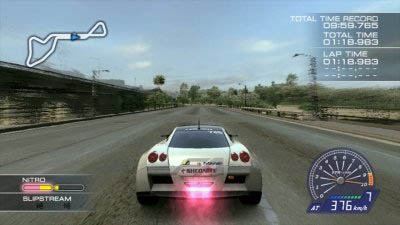
Resistance looks very adequate; it is obviously a well-crafted game but graphically the opening levels don’t surpass the graphical splendour of recent PC shooters. Gundam was, as behooves the series, pretty dire. It was dark and clunky with bad controls and a terrible camera, often behind your mobile suit, blocking the view precisely where you want to concentrate. By the time we encountered a massive invisible wall to prohibit our movement we switched off. The whole idea of invisible barriers is odious, especially in this case as they don’t seem to apply to enemy characters who can stand in safe areas and shoot at you without you being able to reach them, for no visible reason, to slash at them, as shooting is made impossible with the camera firmly focused on your massive mech backside.
 50,000 Yen's worth of disapointment
50,000 Yen's worth of disapointment
A demo CD with pre-rendered movies for Enchant Arm and Armored Core was also a mixed bag of disappointments. Enchant Arms, even in this pre-rendered state, look dire, like a badly made PS2 game and Armored Core had some nice FMV sequences mixed in with underwhelming game-play footage. To be fair, both these products are still being developed.
None of the products we briefly played seemed to look any better than the current crop of Xbox360 games, but the machine seemingly effortlessly pushed the data around like a topper so I have no doubt we will be seeing some stunning games come out later on in its lifetime, possibly 1 or 2 years hence. The biggest problem however is that to reach such heights of graphical quality one can imagine massive budgets and teams need to be involved and few but the richest corporations could afford that luxury. My guess is that for the foreseeable future Xbox360 and PS3 games will be created from the same source to maximize returns for the publisher causing less of a rift than Sony may have hoped for. What the scenario will be like 3 or 4 years from now is anyone’s guess though, and it largely depends on how successful the PS3 will be.
If I allow myself to be cynical, and why break the habit of a lifetime, I’d say Ridge Racer is a portent of things to come: more of the same games but prettier. But Hell, if that is what the masses want, who am I to complain? I am not unaware of the fact that those masses help pay for my daily Pot Noodle! And let’s, for brevity’s sake, ignore the SIXAXIS as the failed, badly-executed and gimmicky ploy to steal Nintendo’s wind that it is.
So buy now or buy later? Well, now if you want to double your investment via on-line auction, but as a gamer I’d recommend holding off for a while. The launch games are all of the variety and quality that you could easily live without for a while and although I spotted no problems, I’m sure Sony will be releasing firmware updates and new versions of the hardware as problems arise with its launch stock – another Sony tradition with all its hardware. If the price comes down I think the PS3 will be a good console to buy, this time next year or the year after. Maybe.
Go to shopping: The Sony Building
 Though the technophile visitor to Tokyo will have plenty to see in the many electronics stores dotted around the map, one good place to see a collection of the latest home electronics and gadgets, from one manufacturer anyway, is the Sony Building in Ginza (or rather Yurakucho but Ginza sounds better).
Though the technophile visitor to Tokyo will have plenty to see in the many electronics stores dotted around the map, one good place to see a collection of the latest home electronics and gadgets, from one manufacturer anyway, is the Sony Building in Ginza (or rather Yurakucho but Ginza sounds better).Though the location has restaurants and a shop it’s the showroom that attracts most visitors as it displays Sony’s latest products. Before this weekend’s launch the PS3 was on display here for a while already, including the hilarious “SERECT” misprint on the controller.
 The newest, massive flat-screen televisions are often on display with surround sound systems and a nice couch to relax on as you take in the massive digital eye. Cameras, computers and laptops, MP3 players, it’s all there.
The newest, massive flat-screen televisions are often on display with surround sound systems and a nice couch to relax on as you take in the massive digital eye. Cameras, computers and laptops, MP3 players, it’s all there.Though ultimately your enjoyment of the Sony building depends largely on your attitude towards Sony products and if you check their shares their position is somewhat in jeopardy, still, they are coming out with some interesting products and the showroom is probably the best place to get a good overview of the gadgets on sale now or in the near future.
 Location: Yurakucho station is on the Yurakucho line, surprisingly, though Ginza’s massive underground station complex, on the Ginza line amongst others, leads close enough.
Location: Yurakucho station is on the Yurakucho line, surprisingly, though Ginza’s massive underground station complex, on the Ginza line amongst others, leads close enough.Website: http://www.sonybuilding.jp (in English)
Map here.
My first aggro
So here I am, pleasantly drunk, yet not debilitated, waiting at a station where I change from the express line to the local to carry me to my final destination. The platform is relatively empty and I am leaning against a wall playing Tetris Red (sticky mode) on my mobile. In the corner of my eye I spot a Japanese guy and his equally Japanese girlfriend take position next to me. The guy has his back to me, but draped over it he is carrying a massive rucksack, and I mean one of biblical proportions stuffed full. Even though there is plenty of space he stands quite close to me and pushes his rucksack into me, possibly by accident. I don’t really push back but offer some resistance. I hear him complain in Japanese but I am so engrossed in my game that I ignore him. He, however, takes no measures to remedy the situation on his end and continues to push his overfull backpack into my rib. I keep offering resistance when suddenly the guy wheels round, throws his backpack to the ground and takes the internationally recognized stance of the drunken man in search of a fight.
I pause my game and look up. “What?” I say in my most British and haughty accent. “’Watto‘?” he cries. “This is Japan, speak Japanese,” he continues in Japanese. It’s at this point I realize the guy is fairly wide and me being a natural coward quickly size up the situation to be wholly against me, physically speaking. The guy, mid-twenties, could easily crush every bone in my body without breaking a sweat. His girlfriend, I notice, is nothing to write home about and is looking somewhat scared. “I speak Japanese,” I reply in my most aggressive Japanese. “Go back to your country,” he continues. “Japan is my country,” I reply dryly. He kicks his backpack, which strikes me as a somewhat self-defeating action. I hope he had something fragile in there. The train stops at the platform, the doors slide open.
We get on the same carriage, his girlfriend carrying his backpack, him shooting off his mouth at me. I had stopped listening at this point, but he was obviously not finished yet. “You wot?” I say in my best vernacular. Learning spoken Japanese from my smoking buddies at work is finally paying off. “You looking at me or chewing a brick?” I continue. The man is clearly more agitated than before. “Go back to your country,” he reiterates. At this point his girlfriend makes a half-hearted attempt to get between us, as if there was the slightest possibility a weakling like me may start throwing punches. “Leave it, Kev, it’s not worth it,” she says, in Japanese equivalent. “Why won’t you die?” he shouts. He is sill posturing. “You drunk?” I say? “Go back to your country before I kill you!” is the reply.
I give him my all-purpose look of quiet apathy, though deep inside me my inner child is praying he won’t get physical with me, as he’d clearly win. “You still looking?” he shouts? There is a short interchange between him and his girlfriend but I pretend to take the high road and ignore him, focusing instead on my game of Tetris. He shouts some more about returning to my country and death and gets off at the next stop, thankfully not the same as mine.
Deeply relieved I sigh as a middle-aged Japanese man sitting in the seats close by suddenly tells me “sorry”. Surprised I tell him, in Japanese, “it‘s okay. He was just drunk.” “No, no,” he says, “he is a bad guy!” “No, it’s okay,” I lie, “he was clearly drunk. It’s okay!” I give him a wan smile. The man still looks uneasy. At the next stop, my stop, another guy from the other end of the carriage stands close-by, ready to disembark, and nods at me with a smile, as if to say “sorry about that twat” I give a polite bow to the first guy and nod back to the second.
Almost 6 years in a country without any drunken, near-violent incident is pretty good going, you have to admit. And the fact it ended with me in tact and innocent bystanders apologizing for the behavior of one drunk, testosterone fuelled mountebank is pretty heartwarming too. Plus it has given me a story to tell my friends at the next outing, so all in all it was a pretty good night!
Cleanliness is next to convenience
 The amount of rubbish that can accumulate on and around a developer’s desk can be staggering, but there is a case to be made for keeping your desk clean, not because a clean workspace is conducing to concentration but because in Japan the one thing they like to do most is move desks.
The amount of rubbish that can accumulate on and around a developer’s desk can be staggering, but there is a case to be made for keeping your desk clean, not because a clean workspace is conducing to concentration but because in Japan the one thing they like to do most is move desks.Nary a yearly quarter goes by without an executive decision to rearrange the office. Sometimes it is done so that newly formed teams can sit together, other times it seems to just be the done thing. Or a new employee needs a space and in stead of putting them at the unoccupied desks available the whole team needs to be reseated to conform to hierarchy; leads sit at the top, producers or bosses have their desks horizontally, facing the rows of vertical desks of those working under them, and the newest recruits sit as far away from them as possible, usually next to the copier or other loud or inconvenient spot.
Unlike the west where nervous employers can be scared with shouts of “health and safety” or “job description” in Japan any move, big or small, is conducted by the staff. Carrying heavy monitors, or heavy devkits as the case is these days, and pushing and shoving desks into new and exciting formations is down to the employees with the boss keeping his hands clean to direct traffic. I don’t think I’ve ever sat at one desk for more than four months in all my time in Japan.
So why are Japanese developers so keen to move all the time? Is it a way to keep the workforce in check, never let them get comfortable? Or maybe it’s more benign; seeing as we spend 99% of our life at our desks, an occasional change of scenery is nice. Personally I think it’s due to typical indecisiveness and inability to plan ahead. I have certainly witnessed a team that was earmarked to be expanded moved into a new area of the office and then walled in by other teams only to have the whole process repeat itself when the inevitable new hires arrived a few weeks later. Or I have seen new shelves put in place only to be moved elsewhere a week or two later, with all the unloading and reloading that entails, for no other reason than somebody thinking it’d look better there.
With this dubious tradition in place, the less you have to move the easier it will be for you. There will be some Japanese colleagues though who have yet to learn this lesson. I once worked with a guy whose desk was the epitome of rubbish, a veritable landfill of crap; empty UFO instant ramen pots, undisposed disposable chopsticks, stacks of magazines and mangas, a bedroll stuffed under his desk, plastic models and papers everywhere.. His keyboard lay balanced on a few small stacks of magazines and his mouse, if it could be found, rested on some empty airfix model boxes. His chair couldn’t be pushed under his desk due to the piles of laziness stacked up there so his daily working posture was either side-saddle or cross-legged.
Whenever said colleague had to move desks it took him the better part of the day, carefully putting all his junk in big boxes and using a cart to wheel them to his new location, where he would unpack everything to recreate the explosion he had had before. And this would happen three or four times a year.
That said, not all developers are that messy. A lot of them are very tidy and a few are even as obsessive compulsive as me, though few go so far as to memorise the faces of those people that don’t wash their hands after using the bathroom and stop them from touching my keyboard or mouse, or use a towel to open the bathroom door. Though having a few magazines and figurines on your desk is a fairly normal occurrence, I myself shy away from those and focus on the bare necessities. My desk contains at most my PC, dual LCD monitors, tablet, keyboard and mouse, gel wrist pads for the latter two (my own, RSI and ergonomics have no Japanese translation*), a large box of tissues, a mug for tea and my mobile phone. All papers and pens and such go in the wheely drawers so they can be pushed to the new desk when necessary. And that’s it.
So unlike my more messy colleagues when the inevitable time comes to play musical chairs again I can be packed, unpacked and set up in no time flat, allowing me to focus on work and not waste hours of my boss’s ti….oh, hang on!
* Or perhaps they do but I don’t think I’ve ever worked for somebody who knew what they meant.
Akiba Robot Undokai
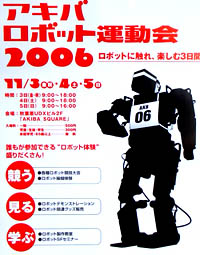 In an effort to get out more and see things outside of my small sphere of interest, I let a friend of mine drag me all the way to Akihabara to attend an event even geekier than anything to do with games: a robot fair. In the area just behind Akihabara JR Station someone is trying to improve the image of this deeply run-down and otaku area by building a series of new, impressive buildings and it was in one of these, the UDX building that Akiba Square, an event hall, is located.
In an effort to get out more and see things outside of my small sphere of interest, I let a friend of mine drag me all the way to Akihabara to attend an event even geekier than anything to do with games: a robot fair. In the area just behind Akihabara JR Station someone is trying to improve the image of this deeply run-down and otaku area by building a series of new, impressive buildings and it was in one of these, the UDX building that Akiba Square, an event hall, is located.On show were not only a wide variety of pretty useless but nevertheless impressive robots, but special sports events, like robot battle and robot soccer, as well as special demonstrations were held. All in all it was an impressive display, but I don’t think humanity has anything to worry about quite yet when it comes to global domination as a species.
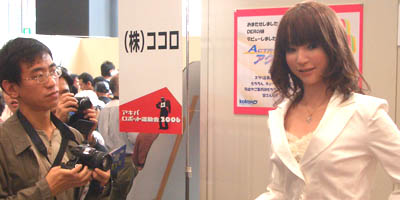
 Though mostly the robots on display were not designed to further the cause of mankind, but rather a display of raw awesomeness, there were a few functional machines there. The toys and remote, walking webcams were there to entertain the kids, there were a few machines to help the disabled, like a wheelchair and robot arm to feed those who can’t perform the task themselves and one or two cleaning droids. On the other hand there were many push-up, athletic robots, a failed skating robot, Asimo gave us all a wave, a tiny battle arena saw two tiny droids jitter each other into submission and by far the cutest robot ever made looked at you with two massive camera eyes when you spoke to it.
Though mostly the robots on display were not designed to further the cause of mankind, but rather a display of raw awesomeness, there were a few functional machines there. The toys and remote, walking webcams were there to entertain the kids, there were a few machines to help the disabled, like a wheelchair and robot arm to feed those who can’t perform the task themselves and one or two cleaning droids. On the other hand there were many push-up, athletic robots, a failed skating robot, Asimo gave us all a wave, a tiny battle arena saw two tiny droids jitter each other into submission and by far the cutest robot ever made looked at you with two massive camera eyes when you spoke to it.
Here is a collection of photographic proofs:
 You talking to me?
You talking to me?

Heavily armoured kids taunt a robot penguin.
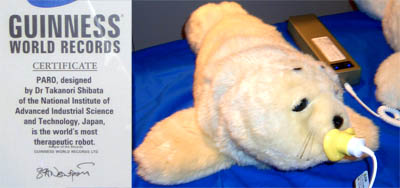
I wasn't aware there is a way to measure how theraputic something is, but there is and this baby seal scores highest.
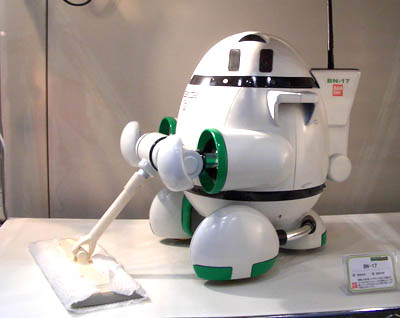
Cute and wipes the floor.
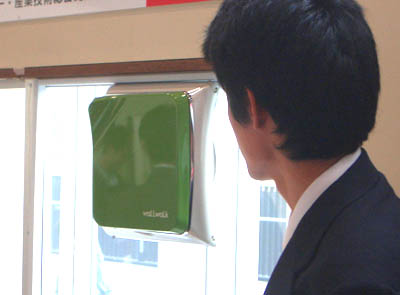
By far the most boring robot: a big green square that cleaned windows.
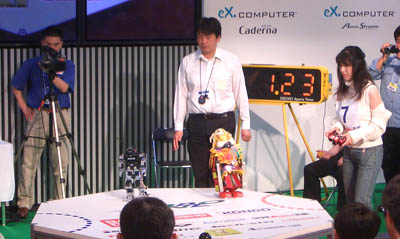 Robot Battle was a harsh contest between two robots to see who could fall over for a bit less often than the other.
Robot Battle was a harsh contest between two robots to see who could fall over for a bit less often than the other.
Worst of Show
 By far the most useless, pointless and badly realized gadget was a tiny floating display which showed the image of a pre-recorded woman floating half an inch orso in mid-air; an entirely unconvincing and unimpressive feat, I assure you. The display had a stand at the bottom on which to put special cards with actions or clothes on, to which the woman would “react” by going into her prerecorded “eating Pot Noodle” sequence. Blowing onto the screen caused her to squeal and shield herself with her hands. Putting the “bikini card” on the stand made her pull-up a curtain, show a horrible cut, remove the curtain and hey presto, she is wearing a bikini.
By far the most useless, pointless and badly realized gadget was a tiny floating display which showed the image of a pre-recorded woman floating half an inch orso in mid-air; an entirely unconvincing and unimpressive feat, I assure you. The display had a stand at the bottom on which to put special cards with actions or clothes on, to which the woman would “react” by going into her prerecorded “eating Pot Noodle” sequence. Blowing onto the screen caused her to squeal and shield herself with her hands. Putting the “bikini card” on the stand made her pull-up a curtain, show a horrible cut, remove the curtain and hey presto, she is wearing a bikini.
The fact someone spent a lot of good money and time on developing anything so utterly useless is astounding. We had a good laugh at it, especially since the guy who showed us how it worked misinterpreted our laughs for delight, rather than derision.
A good but tiring day out, the Robot Fair was packed with visitors and kids and was all in all a fun and fairly impressive experience.
UPDATE: With many thanks to "videogamesartist" some YouTube footage of the event: Realistic Robot Woman, Robot Battle! HUMILIATION., Poor Penguinbot!
Wahey, it’s Culture Day!
“Ah, Japanese culture,” I said to my colleagues over a cigarette yesterday, “so that means, true to Japanese culture, we all come in to work, right?” This caused a brief period of hilarity, followed by a sinking realization that this is actually the case. “JC, you understand Japanese culture too well.” “Indeed,” I quip, “I am Japanese after all.”
But then a miracle occurred. Not 10 minutes before leaving the office a colleague approached me to say we, including me, should please take off today the 3rd, and the weekend. Now, I don’t need to be told twice, but when you’re asked to “refresh”, it is a warning. It is a sign that you are about to go over the top and into crunch no-man’s land. They want you to be rested and ready for the big push. Timeo Japanos et dona ferentes
So, I do have a three day weekend after all, and I have already wasted the Friday in true British Culture style, by loafing around at home doing absolutely bugger all. I may visit the robot fair tomorrow, in which case I’ll take some photos and write up a post on it.
So for now: Happy Culture Day!
A day in the life
There are few people on the platform, but I am not fooled by that. Entry into the train goes smoothly although I spot one troublemaker already; a young woman trying to read a newspaper. By the time we’re a few stops down she realizes it will be an impossible task as more and more people pile on. There is some shoving and jostling. I position myself near two young schoolgirls, as I know they all get off a few further stops long the line, at which point I will be able to take their spot, right next to the door, leaning against the side of the bench; a spot you cannot be jostled away from and one which offers most support against the starts of the trains movement.
Indeed, a few stops down the girls get off, but a sea of people behind me pushes me off and forces me to wait outside. Just as I’m about to step back in an old guy squeezes into the spot I was so jealously eyeing. In my mind I stab him through the throat with a disposable chopstick, the bounder. I am in luck however, as he too gets off a few stops further down and I can finally take my rightful spot on the train for the second leg of the journey.
Things go fairly smoothly until a few stops shy of my destination when the largest crowd squeezes on. At this point in the trip it is always war; for the last two or three stops it is every man for himself as the carriage is packed beyond capacity. When one guy gets on, my age but fairly stocky, in a suit and carrying a briefcase, he doesn’t move into the train but moves sideways into me. As I have no place else to go, with metal bars behind me, I offer some resistance but he doesn’t seem to notice. At this point I give up pretence and physically push him off me with my arm, which somehow seems to annoy him. He makes a face and starts sighing in a dramatic manner. There is no space for my feet so I happily let one rest on top of his. Annoyed he pulls his foot from under mine and puts it on top. I return the favour at which point he gives up, moves his foot away and gives me a look of pained annoyance and sighs, frowning. I stare at him impassionate and I hold his gaze for a little longer than he is comfortable with. He turns away, defeated, and starts sighing. After a half dozen sighs it is obvious everyone is ignoring him, especially me, and he stops. But he is not done with me yet.
When the train sways people lean in on each other, at which point my position becomes dangerous. Squeezed in between a metal pole and a sea of people can knock the wind out of you. I offer as much resistance as I can but it is no use. I try to go limp, which is often the only way to survive. Mr. Foot, however, is carrying his briefcase in front of him and a corner of it pierces my thigh painfully. The guy squeezed in between Mr. Foot and the door also has this problem, as I see him try to look behind him with a pained expression. It is not just me he is inconveniencing, I noted, which somehow justifies some kind of revenge. When the trains stops and the sea of people sways the other way for a fraction of a second I turn sideways. As Mr. Foot sways back in my direction my high is now on the flat of his briefcase forcing him to take a slightly bent stance. This ensures he spends the rest of his trip in an uncomfortable position. I try to leverage myself against the door, accidentally prodding the other victim. “Oh, excuse me,” I mutter, to which he gives a polite and conspiratorial nod. Mr. Foot has no hope. When it is time for most people, including myself, to get off, I make sure I push Mr. Foot sideways in a defiant gesture that shows him my contempt for his person. A hollow victory, but a victory nonetheless.
On the short walk to the office I pop into the convenience store, Sankus, to buy me a new box of tissues, a piece of equipment no developer should be without, and an ice latte, which will be my breakfast. In front of the office I have a quick cigarette before going in and think to myself “damn, I’ve dressed too warm again”. The weather is all over the place and you still see people with bare arms walking about. I was caught off-guard last week in a wife-beater and a T-shirt on a day temperatures were decidedly wintry. Since then I have been wearing winter clothes under my light jacket and in response the sun hasn’t stopped shining. Still, I’ll be glad of it in the evening when things cool down remarkably.
I enter the office, unlock the doors and switch on all the lights. Noone stayed overnight so the air is clear and the temperature do-able. I switch on the PC, wash my hands and switch on the kettle, ready for a few hours of uninterrupted work before my colleagues saunter in. It is now roughly 8.30.
Suddenly the quiet, peaceful atmosphere of the empty work-floor is broken as the team lead’s mobile phone goes off where he left it on his desk last night. “denwa desu denwa desu denwa desu” a female voice repeats quickly for about 2 full minutes. As I am not in the habit of picking up business phones in Japan, let alone other people’s private mobiles I let it finish and get back to work. Not five minutes later the process repeats itself. “denwa desu denwa desu denwa desu”. I wonder what kind of psychopath rings a mobile, lets it ring for two minutes and then, after it wasn’t answered tries again shortly after. It finishes and I get back to work.
Not five minutes later, the mobile decides to change its tune and suddenly starts bleating an electronic ragtime tune, again for a full two minutes. As this time it is much louder than the female voice, it shatters the calm like a sledgehammer. At this point I have a deep personal hatred for the absent lead I had never felt before, or at least never so strongly. And again, five minutes later the phone goes off again. And again. I carry it outside and put it in the kitchen area. Peace and quiet once again.. The discovery of the phone there later in the morning by a colleague will cause some whispers and confusion.
I open up the web browser and fire up BBC internet radio; I can’t imagine what I’d do without it. With my headphones on I start up Maya.
As I’m working on some model, cleaning up and reworking, which bores me to tears but is sadly a necessary task, other people start coming in, some quiet and some offering a friendly “hello” as they step through the door.
I check the clock, it’s about 10.30, not everybody is in yet. I go for one of the many cigarette breaks which I’ll partake of during the day; in quiet times once an hour, when I’m busy less often, but I always smoke two very light cigarettes in a row. I have many conversations with colleagues during these breaks.
What weather, eh? It’s so easy to catch a cold. Wasn’t it cold last week compared to now. So, you getting a PS3? No, what about you? Too expensive. No interesting games. What are you playing these days? Yes, I’ve heard of it. How do you say this in Japanese? Sensei arigatou! Haha! Do the Japanese actually care about HD-TV? I may get one if the December bonus is alright. What are you working on right now? The boss decided what?! He really is a buffoon. You planning on coming in again this weekend? Yeah, me too, probably. What time did you leave last night? Wow. By the way, how do you do this in 3DSMax? No, I prefer Maya. Did you hear about, oh, yeah, I was quite shocked. What brand is that you’re smoking. What are the winters like in England? Aren’t the lifts in this building slow? The what? Oh, elevators. Did you hear about Wii pre-orders yet? I’m not queuing. Aren’t Japanese game company working practices utter shite? No, how old do you think I am? And you? Wow, I thought you were younger than that. I’m so tired. Otsukaresamadesu.
The morning is uneventfully wasted away by me fiddling with this model. 3DSMax crashes: 5, Maya crashes: 0. Time wasted while waiting for the exporter to do its job: 30 minutes orso.
A colleague taps me on the shoulder and asks me if I want lunch. A few of us go out and spend 20 minutes finding somewhere nice we haven’t been to before. Eventually we find a restaurant where we all eat ishiyaki lunches, a variety of foods served in a hot stone bowl, so it cooks still a little at your table. I chose the curry and as it is brought to the table I regret it instantly; it is massive and piping hot. Valiantly I attack it with a metal spoon and soon kick the largest part of it into a cocked hat.
Despite the dutiful image Japanese workers portray they can bitch and moan like the best of them and most of the lunch is spent arguing about how dire the situation in the office has become. I drift in and out of the conversation as I am still tired and can’t concentrate on the Japanese well enough. Also, I have burnt the roof of my mouth on the curry.
After lunch we all pay, separately, at the till and a colleague and I pop over to Starbucks for a take-away coffee.
Back at the office the severity of the lunch settles in on me and a food coma is palpable. For the better part of the afternoon I fight off the drowsiness and try to cope with the heavy feeling in my gut. Tomorrow, I tell myself, a light lunch is in order.
I preview my morning’s work on the monitor. Hmm, that is odd. I have to recheck those material settings and re-export. As I wait I ask the art lead about my upcoming tasks. We have to be art-complete soon, too soon. I still have to do X, Y and Z before then. Oh, I can’t do X yet, I am told, as the planners haven’t thought about that yet. The art lead sees the look on my face and gives me a half-smiling nod of acknowledgement. I tell him if they don’t decide this by tomorrow I will not be able to finish it on time. He nods. If I’m lucky I have what I need by the end of next week, experience tells me, by which time only a massive effort by me, lots of overtime and a weekend or two will guarantee it is finished on time. I put the planner on my mental list of people to put against the wall when the revolution comes.
The afternoon passes and I am surprised to find it has gone dark outside as I go for a cigarette break. That means it’s, what, 5 or 5.30 or something. The after-lunch food coma has subsided and made way for a general feeling of malaise and tiredness. I can’t remember when I had my last full weekend off. It wasn’t too long ago, but 6 day weeks really take it out of me at my age.
I ask the art lead about this week’s national holiday on a Friday. The congenial chap nods, thinks and starts chatting about schedules. He ends with “I’m not going to tell anyone they have to come in”, which on the surface sounds decent enough, but I know him well enough to recognize the underlying plea for me to come in anyway. Sigh, a three day weekend shot to Hell. Again.
BBC 7 radio is now broadcasting its Kid’s Hour. I switch it off and start browsing my music library for things to fill the rest of the day with. D&B? No, I’m too headachy for that. Some techno? Some audiobook? In the end I opt for the calming, soothing strains of Prokofiev.
By early evening my productivity has dropped immensely. I finish this last task I have set myself, re-export and check it running on a monitor. Damn, still some unexpected problems, all due to some undocumented and unexplained problems with the exporter plug-ins no doubt. Or maybe someone changed some code again. In stead of going home I sigh and resign myself to the fact that this needs to be sorted before I can leave. I set back to work, changing a bit here and there. Redoing a texture which was showing a few problems. Changing the UVs in that little corner. In the end the previous exporter problems turn out to be my fault, or rather 3DSMax’s; importing models from a Japanese version of Max, my colleagues’, into an English version, mine, can bugger up material names if they contain Japanese. These turn into gobbledygook which then confuses the exporter. I go through all the materials, just to be sure. Why does 3DSMax’s material editor suck so badly? I re-export, check it and think “good enough”. I upload my work to the server, which has no source control and decide to go home. I switch off, making a big show of packing my bag and putting on my coat to dissuade anyone from approaching me right now to ask for this and that to be done by tonight. “Osakini” I say to the team, “otsukare” they call back individually. And I’m out the door. First one in, first one out. It’s 8.30 again. Good, I think. I’m early.
On my way to the station it’s fairly busy. Why do so many Japanese people walk so slowly? I duck and dive my way through the crowds and climb up to the station platform. And old geezer in a suit is staring into space around him and notices me. He stares at me for a bit until I make eye contact, at which point he realizes what he is doing and turns away, almost embarrassed. The ride back is busy but not as busy as the mornings. Still, the only time I can ever get a seat is when I go to work on weekends or national holidays. Like this coming Friday and Saturday, Well, that is one thing to look forward to, I guess. I get jostled a little on the train but not much. By this time I am way too tired to have a fight with anyone, so I let it slip
It’s about 9.30 when I get home. I have a quick supper; check my emails and forums, and the blog. Damn, I think to myself, I didn’t write anything this lunch break. I open Word and stare at the blank document for a while. I close Word and watch some television. Shall I have a bath? No, probably not. I’m off to bed, it’s midnight.
I slap the earless robot cat on the head and it chirps at me that it has been set up. I try desperately to sleep but can’t help thinking of those tasks yet to do. By 1 I fall asleep.